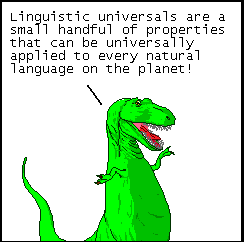Language Log has done a much more thorough beatdown of this story than I could, but it’s still worth mentioning.
English contains more words than any other other language on the planet and will add its millionth word early Wednesday, according to the Global Language Monitor, a Web site that uses a math formula to estimate how often words are created.
It is a silly claim, especially when you realise that English already has an infinite number of words right this instant. You can paint a fence, and then you can re-paint the fence, and then if you have any paint left, you can re-re-paint the fence. In fact, you can keep adding re- as many times as you like, on to infinity, and each one of those will be a separate word.
Or you can have a great-grandmother, and a great-great-grandmother, and a great-great-great-grandmother, on and on to infinity.
That’s one of the things about English morphology: it allows some prefixes to be used recursively. Recursion is why English (or any other language, pace Everett) can have an infinite number of sentences. You can walk and walk, or you can walk and and walk and walk, making the sentence longer and longer and longer, on to infinity.
Quibble about hyphens, if you like. I could argue that a hyphen, not being whitespace, does not constitute a word boundary, and thus words containing them are kosher. If you wanted to push it, you could even consider multi-word expressions as words themselves. After all, ‘ice cream’ contains a space, but it represents just one thing. It can be found variously with a space, a hyphen, or all smashed together. Your definition of ‘word’ will influence your count.


Recent Comments